Note: The following article makes brief mentions of sexual assault. It also contains moderate spoilers for Neo Cab.

For a long time, the automated car has felt so close to becoming a reality, yet so far. On the one hand, we're flush with personal AI assistants and image recognition algorithms. Our factories have been automated for decades, and our phones can use adaptive computer code to erase objects from photos. With these advances, it feels like the driverless automobile is running late. Nonetheless, it's not arrived, and we've been told it's "Just around the corner" since at least 2015, which has cemented the technology as the quintessential example of Silicon Valley overpromising. So, what will it take to transport us to the world of AI taxi drivers? And what might life look like for the everyday worker if we get there? Chance Agency's 2019 game, Neo Cab, has thorough answers.
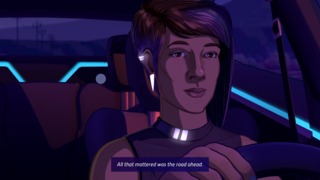
Neo Cab's protagonist, Lina, is caught in the crossfire of the AI revolution. She is a former employee of the shrewd megacorp Capra, which, in a previous life, operated as an Uberish ride-hailing service. The second Capra rolled out its automated taxis, it spontaneously fired all its drivers. Lina now eeks out a living in the near-future city of Los Ojos, driving for Neo Cab. Her new employer is a lesser economic competitor offering the boutique experience of a taxi with a flesh and blood operator inside. Even as we touch down on Neo Cab's backstory, the game is challenging our preconceptions about automation.
Common sense dictates that if we want to stem the tide of automation, then we need more people in jobs. Yet, some companies use human labour to accrue the capital to implement a computerised workforce. This creates a paradox in which getting more people into certain jobs can mean their work will be taken by AI in the long term. In Los Ojos, that bait-and-switch occurred under Capra; in our world, Uber and Amazon look eager to do something similar. Still, it's obviously not a shortage of cash keeping tech empires from rolling out the driverless car. So, let's talk about the real barriers.
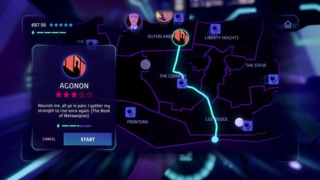
One issue is that even if you invent the self-driving car, or whatever other technology, that doesn't necessarily mean it will be ubiquitous. A lot of our tech now is controlled by relatively few puppeteers due to being tied up in intellectual property law. In Neo Cab, Lina's job exists because there is one company that was able to patent a driverless car system, and every other taxi firm has to try and drive without it. Although, that is one more company than has developed a reliable self-driving car in our time.
As Neo Cab teaches us, we aren't being shunted from a manually-operated society to an automated one overnight. Some tasks it's more straightforward for a computer to perform than others. The game doesn't expound on what makes a task "easier" or "harder" for an AI, but the general trend is that automation does well in predictable environments that aren't going to throw a lot of curveballs at it. Almost all of those environments are tightly controlled for the sake of making them fit the narrow-minded AI. Think factory floors, video game rulesets, etc. But in messy, organic systems where the rules and contexts are constantly changing, computers flounder. Much of the driving done in the world happens in those chaotic contexts.

An autonomous car in flat lighting on a well-maintained road with no weather visibility problems has nothing to fear. But if it's snowing, street signs are damaged, pedestrians appear in dappled lighting, the vehicle has to negotiate with other motorists, or if you run into any number of edge cases, a self-driving car's senses can fail it. Advocates for driverless cars are quick to say that only the outliers trip up this tech, but if you can't account for outliers, you can't account for real streets.
Getting a bundle of electronics to understand human dialogue and respond appropriately is probably harder. Sentence construction is devilishly complicated, with words morphing their meaning as they are placed within different grammatical and semantic holders. Cues for tone and meaning are subtle and inconsistent, as is body language. And you have to pull from complexly interlocking knowledge bases every time you form an opinion and express what you think. The current work in conversational AI is at once breathtaking and far short of the real thing. What's more, the appropriate margin for error varies between tasks. If a computer program can't identify a flower species from a photograph, that's not the end of the world. If it can't work out which shape in the road is a child, you're in big trouble.
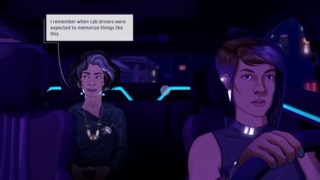
AI's hike to absolute competence is slow, and the most obvious conclusion to draw from that is that some jobs are getting automated before others. In Neo Cab, "taxi driver" is an occupation that digital minds can slip into easily but something like "quantum statistician" is beyond their capabilities. Less immediately evident is that when some tasks can be automated, the pressure on workers to perform non-automatable tasks, and the standard at which they're expected to perform those tasks, dramatically increases.
In isolation, Lina's driving skills and car are no longer profitable assets. It's only the "authenticity" of manually driving a car and her social skills that she can sell to a consumer. That means that her job hinges more than ever on her ability to converse with customers in a manner they appreciate. Not every client cares about cross-seat patter; some are happy enough to lounge back and play on their phone, or can recognise Lina as a person just trying to get by. But from the rest, there is more push to conform to their idealised image of a big city cabbie. To some, that means a folksy streetwise caricature; to others, she's an object of fascination like a zoo animal; to others still, she's a punching back they can say and do whatever they want to. Neo Cab suggests that as people have become more used to interacting with computers to meet their everyday needs, their social skills have atrophied. They have forgotten how to speak to service workers, although there are some people who have never known.

And if Lina doesn't play into her customers' expectations, she might be left without an income and without a home. She exists in that precarity partly because of how the taxi industry was run even pre-Capra. Firms in the Uber model don't have formal hiring or firing processes, and while other jobs might review an employee once every few months or once a year, gig work employees are rated after every job. It is that much faster to eject them from their post, and individual customers have a direct position of power over them. Throwing employees overboard strips no skin off the nose of the platforms because of the simplicity of recruiting new workers and the abundance of their labour.
Furthermore, gig work employees are operating on razor-thin margins. Many gig work companies are effective at extracting value from their workers because they've figured out how to make them pay for their own tools. A traditional taxi driver didn't have to fork out for their fuel, but a ride-hail driver like Lina does. And with that drain on our income, missing one or two fees a night could be the difference between breaking even and operating at a loss. Then you have to factor in spontaneous interruptions like customers changing the pick-up point or police pulling you over.
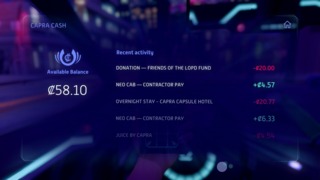
As we juggle Lina's fuel and accommodation expenses, we experience that the problem for the gig worker is not just a consistently low standard of living. It's also that their financial conditions are subject to fluctuations. The number or length of rides we might be offered each night is fluid, and fuel prices yo-yo based on the markets or where in the city we find ourselves. Neo Cab could be harsher in forcing you to balance your books, but it effectively communicates the dreadful uncertainty of gig work. It also conveys that when you are making scraps, savings aren't just a safety net but also offer some freedom and dignity. When you're not starving for cash, you can afford to be pickier about which riders you pick up or how much disrespect you take from them. But even freedom is relative, and with the fickleness of the job, you must save some money in case of a sudden famine of work.
There's the sense in Neo Cab that Lina's occupation might not exist for much longer. Maybe, just for now, the human touch is enough to build a taxi business on, but it's a speciality interest, and all the little gaps in the market are getting filled in by the megacorps. The irony is that Lina can't sell many of her customers an authentic conversation anyway. It's not that you never say something true to a passenger or can't ever stand up for yourself when they're trying to push your boundaries. However, you'll find many prompts for which you know your earnest response might be disappointing for the rider, and you have to decide whether to zhoosh up the truth for a superior "customer experience". Some customers can't buy an authentic conversation because they're so rude that you'd never be speaking to them if they hadn't paid.
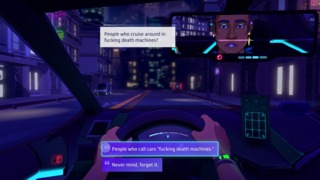
Most public-facing writing on driverless cars is either about its technological or economic aspects. There's not nearly as much ink spilt on the dimension Neo Cab is covering: the interpersonal impacts. Even when trying to understand how autonomous vehicles enter our world, we have to be conscious of the social component. This is not comfortable to think about, but you're probably never going to reach 0 deaths from driverless cars. Even if you coded the perfect motorist, pedestrians could put drivers in circumstances where they have no choice but to collide with someone. It's why researchers are asking questions like, "If it came to it, should a self-driving car hit three adults or one child?" or "Is it better to kill two people violating traffic laws or one innocent?".
Therefore, you won't get autonomous cars on the road just by raising capital and enhancing their brains. An essential step in the process is normalising deaths by driverless car. In our age, manually driven cars are associated with rigorous safety checks, while the autonomous car still feels fairly dangerous and liable to lose control. In Neo Cab's future, the autonomous vehicle has been improved to the point where the human-driven car now claims more lives. Accordingly, the stigmas associated with each mode of transportation have flipped.
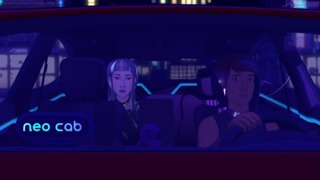
Of course, just because Capra's driverless cars are safer than their non-autonomous competitors doesn't mean they're as safe as they could or should be. And what makes this world scarily believable is that, for many countries, it's not a stretch to think they'd accept hundreds or even thousands of deaths a year from self-driving cars because they already tolerate an equivalent quantity of deaths from other sources. Lack of medical care and regular car crashes are enormous killers worldwide. In the US specifically, thousands die of gun deaths every year. The line between the world now and a world which embraces the driverless car isn't the green light for random, inescapable violence. That already exists. What must happen is the normalisation of a new type of violence. Although, I do suspect that high-regulation, low-violent crimes regions, like Western Europe or Japan, would demand a high standard for autonomous automobile safety.
Given that over 46,000 people die from vehicular collisions every year in the US, a less dangerous mode of transportation could do monumental good. The citizens in Neo Cab are well aware of the benefits, with many taking to the picket line in support of a ban on manual cars. It's a ban that, predictably, has the backing of Capra. Capra churns out tearful media about the human cost of manually-driven automobiles and even fakes grassroots support for their corporation among pro-autonomous protestors. Yet, as a taxi driver ourself, we know what it would mean to lose our manual car. Neo Cab depicts a distasteful catch-22 that we may have to stomach one day. You can stick up against big business and keep the drivers on the economic ropes from getting fired, or you can reduce the number of road deaths. But you can't do both. Capitalism will have its blood one way or another.

While a fictional company, Capra's legal meddling has them following in the footsteps of Uber. Uber wrote the book for the Silicon Valley taxi industry, and it had to change the law to do it. When the company first mosied into cities, it was somewhere from a legally grey entity to an outright criminal organisation.[1] To quote one Uber executive, "We're just fucking illegal". You had an unregulated taxi firm that didnot extend employee rights to their drivers, and one of the reasons the field was regulated beforehand was for customer safety.[2] States can identify licensed taxis in the case that the driver decides to kidnap or assault a passenger, but Uber didn't have to report to the state.
If you want to look into it, there was this wild period in which Uber tried to sabotage law enforcement's investigations into it with ghost cars and held secret behind-the-scenes meetings with world leaders.[2] But there are two particular areas of this history that Neo Cab riffs on. Firstly, in Neo Cab, sometimes you have to pick between following the law and providing a worse taxi service or bending the rules and potentially getting ticketed. Ride-hail drivers face that exact dilemma today. But in addition, when Uber was still establishing itself, it was instructing its drivers to keep working even as the police were fining and towing drivers. Those workers also had to choose between what was profitable and what was legal.[1]
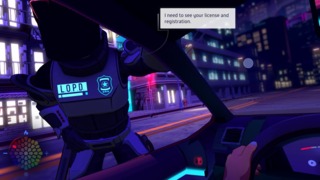
Secondly, sometimes Lina's interactions during her shift threaten to spill over into violence. A few times, I wondered if saying the wrong thing to a customer might trigger a physical response from them. Lina is a woman of colour driving around a city alone at night. Uber was banned from London, England, for failing to report sexual assaults in their vehicles and for performing lax background checks, among other incompetencies. According to their records, in 2020 alone, there were 998 sexual assaults reported in Uber vehicles.
Other times, Lina and her customers are caught in crowds of activists that become so ferocious there's a possibility of someone getting hurt. Like Capra, Uber extorted their legal rights through exploiting tragedy and throwing their weight behind protests that endangered workers. While taxi drivers worldwide protested willfully in favour of their livelihood, Uber encouraged their employees to attend counterprotests. Assaults against their drivers became a recurring problem, with some even being murdered.[3]

When then-CEO, Travis Kalanick, was warned that violent far-right agitators had entered the ranks of the anti-Uber protestors and that he should withdraw his own workers, he responded that this turn of events would be favourable for Uber. In his words, "violence guarantees success". Talking about the issue more generally, one manager commented, "We'll keep the violence narrative going for a few more days before offering a solution".[3] The sordid details of Uber's rise mostly came to light after Neo Cab released. Still, in retrospect, the game underestimated how much of a moral void Silicon Valley is.[2]
There are still a few starstruck techno-optimists who think we can automate our way out of crisis. Neo Cab is a dystopian rejoinder to that view. It depicts the driverless car as being ushered in by a new wave of corporate opinion-laundering and as displacing and increasing pressures on already desperate workers. Even then, it edits out the most disgusting tendencies of the industries it satirises. In a lot of ways, it feels like a mercy that the self-driving car is still science fiction. Thanks for reading.
Notes
- Today in Focus: The Uber files: the unicorn (part 1) by Michael Safi, Johana Bhuiyan, and Paul Lewis (July 11, 2022), The Guardian.
- Uber broke laws, duped police and secretly lobbied governments, leak reveals by Harry Davies, Simon Goodley, Felicity Lawrence, Paul Lewis, and Lisa O'Carroll (July 11, 2022), The Guardian.
- 'Violence guarantees success': how Uber exploited taxi protests by Felicity Lawrence and Jon Henley (July 10, 2022), The Guardian.
All other sources linked at relevant points in the article.
Log in to comment